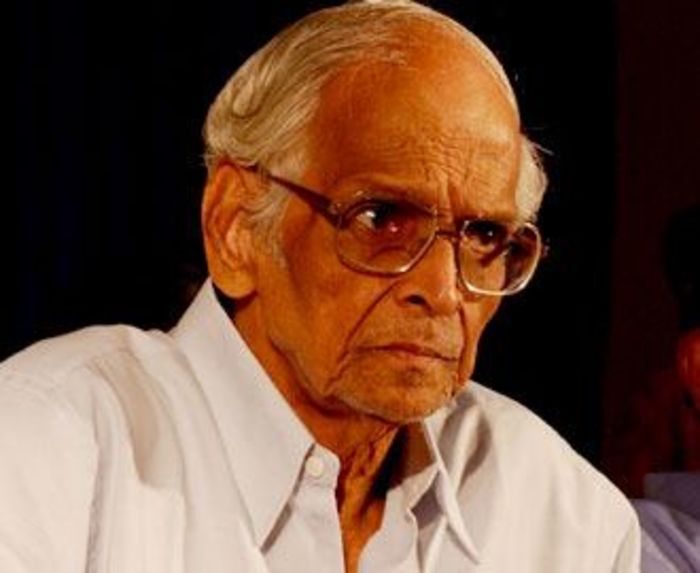P Bhaskaran was one of the most prolific filmmakers in Malayalam. In a career spanning more than three decades, he wrote thousands of songs, produced several books of poetry and directed more than 40 films. If his poetic oeuvre was predominantly shaped by romantic imagination and the social realist aesthetics of that period, his career in filmmaking was a complex journey through several genres and narrative modes.
In the early days of Malayalam cinema, it was filmmakers like Bhaskaran, born in 1924, who gave a fresh life and flesh to it through their charming films. Films like Neelakuyil (1954), Rarichan Enna Pouran (1956), Adya Kirananagal (1964), Irutinte Atmavu (1967), Anveshichu Kandethiyilla (1967) and Kalli Chellamma (1969) etc brought the land and life of the emerging nation of Kerala into the secular space of the celluloid medium. For instance, a film like Neelakuyil is rare in Indian cinema for making a stark portrayal of the deep ambivalence inherent in the modernist project – here you have the emblematic figure of progress, rationalism and modernity, a school teacher (played by Sathyan, in his first major appearance, who was to dominate Malayalam cinema for the next two decades along with Prem Nazir) in a villainous role. In the film, this stereotypical harbinger of enlightenment of the times, loves and impregnates a dalit woman and then betrays her leaving her to the lonely, miserable death of an outcast. This figure of the protagonist and the surrounding milieu in Neelakuyil poignantly presents the deep conflicts that animated Kerala’s modernization project – one which was torn between a modernity that was not adequately socialized, and a sociality that was not adequately modernized.
Films like Rarichan Enna Pouran take this question further, frontalising the adolescent figure of Rarichan to tell the disturbing story of the new citizen in a nation-in-the-making. He was also the first to make a full-length comedy in Malayalam, Nair Pidicha Pulival, in 1958. Kalli Chellamma, based on a novel by Vivekanandan, portrays the struggles and travails of a lone woman fighting her way through a patriarchal society and its values.
It is this deep and critical sensitivity that marks filmmakers like P Bhaskaran apart from the sloganeers and polemicists of the period. Through his works, he brought to the surface the angst of his society and more importantly, also the joys of romance and the lyricism of hope . His lyrics illuminate a whole inscape of yearning, hope, love and despair of that generation.
In the later decades he tried his hands at several genres, right from family drama and slapstick comedies to mythologicals and spirituals. His forte was literature and almost all his outstanding films were based upon the works of well-known writers like Uroob, MT Vasudevan Nair, Vaikom Muhamed Basheer, Parapurathu, K Surendran, Vivekanandan, etc. But the mood of the late 70’s and 80’s were not in favour of such works. There was a turmoil in arts and politics and a new generation of writers and filmmakers entered the field, pushing out established ways and styles, both in literature and cinema. By that time, Bhaskaran was gradually withdrawing from active filmmaking and more into poetry-writing.
One has always wondered why this very socially insightful filmmaker of the first decades of his career that spanned from the mid-50’s to the early 70’s suddenly turned to films like Arakkallan Mukkalkallan (1974), Thacholi Marumakan Chandu (1974), Srimad Bhagavad Gita (1976), Jagadguru Adisankaran (1977) and Guruvayur Mahatmyam (1984) etc (all mythologicals or crass entertainers) in the next phase of his career? When posed the question, Bhaskaran gave that typical half smile of his and asked back,”Would you pose such a question to a lecturer, a clerk, a banker or an engineer? I did it because that was my job, that was part of the profession I was in.” But retrospectively, one feels that apart from professional exigencies, there were other reasons too. In the euphoria of modernism in literature and the new wave in cinema, and the turmoil of politics (the Emergency and the Naxalite movement, irrevocably redefining the interface between the state and liberatory politics ), filmmakers and writers like Bhaskaran were relegated to the past. There was no place for them in those celebrations of the ‘aesthetics of the moment’. It must have been this amnesia of celebration that drove him to take refuge in films and endeavours like that.
Apart from being a great filmmaker, actor, lyricist and poet, he was also the founding chairman of Asianet Television – the first television channel in private sector in India.
Bhaskaran passed away on February 25, 2007. A true artist, his works will always be remembered and treasured by the future generations, for they were true to their times and dreams…


